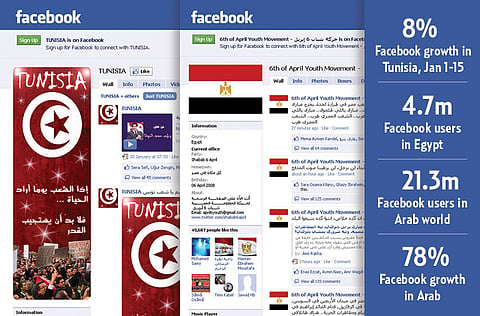New face of social networking
Huge shift in usage as facebook becomes tool for organising demonstrations and rallying public

Dubai: During the first two weeks of January this year, Facebook penetration in Tunisia increased by eight per cent. The uprising in Tunisia — also known as the "Dignity Revolution" — was facilitated by the social networking site as a tool for organising demonstrations and rallying huge numbers of members of the public, which ultimately resulted in the official resignation of President Bin Ali.
This indicates a huge shift in the use of the networking site, which primarily was used for social and business purposes before. "Just before the events in Tunisia, more of the usage was basically social in nature, as with most countries around the world… but when political events, or civil movements started in Tunisia, we witnessed a huge shift from mainly social use of Facebook into more political in nature. So people started using it to call for demonstrations," Fadi Salem, Co-Author of the Dubai School of Government's (DSG) inaugural Arab Social Media Report, and Director & Fellow, Governance and Innovation Programme told Gulf News yesterday.
It's not only the fact that this online shift occurred, but the speed at which it happened was particularly dramatic, he said. "Users of the social networking platforms in Arab countries seem to have the ability to organise themselves in many ways, in ways we weren't thinking are possible," he said.
The DSG spent nine months compiling data before releasing the report, produced by the Governance and Innovation Programme.
It's the first in a quarterly series that will highlight and analyse usage trends of online social networking across the Arab region. The next report will look at trends in other social sites such as Twitter and LinkedIn. Facebook was the subject of the inaugural report as it's the biggest social networking site with some 500 million users around the world.
Soon after the Tunisia uprising, Egypt started to witness mass protests that are ongoing to this day. With 4.7 million Facebook users, the country constitutes approximately 22 per cent of total users in the Arab region. The country's internet was shut down for a total of five days. However, while the flow of information was slowed, it didn't stop completely.
"Censorship of [the] internet is dead or in process of dying, there is no real ability to anybody almost from now on to censor or block totally internet usage. We witnessed this as a clear example in Egypt," Salem said.
People were "creative" he continued: they shot videos on their mobile phones, transferred them to others via Bluetooth in demonstrations and once there is one person who can get a connection, the information is released. Traditional dial-up internet connections were also used to call out to other countries and people leaving a particular country could take the said videos out and submit them to the internet.
"So basically blocking Facebook, blocking Twitter, blocking the internet, the sooner that people in Governments realise it's not effective all over the world, the less resources we would be wasting on that," he said.
In Egypt, the connection was eventually restored, and it's an example that it cannot really be blocked effectively: "You can try, you can make it harder, but effectively the flow of information will continue to exist". Societies organise themselves. Facebook wasn't just used to organise political rallies, demonstrations and gatherings, however.
With Tunisia left with no government, people took it upon themselves to arrange the tasks the government had previously taken care of.
Cleaning the streets, organising traffic and even addressing health care issues have started to be organised via Facebook by communities. The same trend is also being seen in Egypt.
"So it seems that people, when there is a lack of an entity that organises their life, with a critical mass of users available on social networking platforms in some Arab countries, they were able to do the jobs that the government was supposed to do," Salem said.
Social media tools, he continued, have enabled information to flow horizontally. "There are fewer and fewer bottlenecks, so it's extremely hard to block or limit the flow of information". This, he said, is a trend that's an opportunity for societies and governments to utilise: rather than viewing it as a threat, it should be seen as an opportunity for creating new dynamics within society, to interact with the public and even create new policy.
- 8%: Facebook growth, Tunisia, January 1-15, 2011
- 4.7: Million Facebook users, Egypt
- 78%: Facebook growth in Arab world, 2010
- 21.3: Million Facebook users in Arab world
Timeline
- February: Egyptians' first use of Facebook in Presidential campaigns
- April: Social media informs 1st Sudanese election in 24 years
- June: Lebanese social media users provide critical input on government's proposed e-transactions law
- September: Syria issues zero tolerance policy on school corporal punishment after Facebook/YouTube videos
- October: UAE lifts five-year ban on Flickr
- December: Saudi Ministry of Culture and Information develops social media regulations
- December: Social media becomes primary source of coverage of Tunisia events
Source: DSG Arab Social Media Report. For full references, log on to Gulfnews.com



